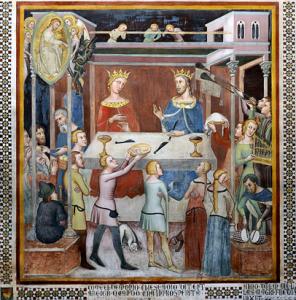 My dad in eighty-three years of life has run into all kinds: saints, grifters, prophets, and madmen. One thing he taught me is that when all the weirdness is gone, there is death. A living human in touch with the divine and still living in the cosmos, religion and science united, will be both worldly and other worldly. Like the Lord Jesus, this person will feast with tax collectors and sinners, and yet also call us to holiness.
My dad in eighty-three years of life has run into all kinds: saints, grifters, prophets, and madmen. One thing he taught me is that when all the weirdness is gone, there is death. A living human in touch with the divine and still living in the cosmos, religion and science united, will be both worldly and other worldly. Like the Lord Jesus, this person will feast with tax collectors and sinners, and yet also call us to holiness.
He will remove no moral law, but cast no stones. In the School of Souls, the real student always will seem strange. Why? He will not reject the data of the physical or metaphysical realms. He knows they are one and so will not reduce them to one or the other. He knows we are not just our brains, but that our brains count! This will always seem weird to cultures that try to simplify everything to either matter or mind.
The weird says: “Well, not as I experience reality!” I have learned from a man given a frontal lobotomy by the secular State of New York for the crime of being Black. He was weird, but often oddly wise. I have learned from people with doctoral degrees who mocked the pretentious puffery of their own universities and refused to play the game. I have learned from pastors martyred by religious institutions for doing their job.
Evidently, “embracing weirdness” is problematic to some, though I think it a good sign. Socrates was thought weird. Jesus was weird. God bless the weirdlings. Here is a critic of this idea:
As for the ‘weird’ part, weirdness differ in every age and different place. And I can think of many people who embrace their weirdness. I mean the Christianity faith have it own weirdness. Like how you’re supposed to eat the ‘bread’ and ‘blood’ of your savior or thinking magic ‘enchanted’ water is somehow going to protect you from unseen evil. Yet that weirdness is normalized and nobody think about it.
I do not dispute the Christian faith has weirdness. I glory in rational weirdness, because the rational are almost always weird. How could a grand attempt to live in the full reality not look weird to people who think getting a raise in their paycheck is the greatest good? How can seeing the True Light not look weird to anybody who thinks the new reality television show is their greatest good?
One glorious feature of Christianity is that all the weirdlings of all nations are gathered before the Throne. Our weirdness is purged of falsehoods, ugliness, and sin. We are left as we should have been. We stand as unique reflections of the True Light. We eat the very Body and Blood of our Christ, but we know that we eat bread and drink wine. We think there is more to reality than accidental physical characteristics. Jesus Christ unites us, in an outer sign, with the inner reality of His life. That is “weird” (as in different from what you might have heard), but not irrational. Read Aquinas. Take a glance at Saint John Chrysostom. If you have read neither, realize your education was limited.
As for “holy water,” the critic of the weird seems to think the only evils are those we can see. I do not know about him, but many, though not all, of the struggles in my life are not those that can be seen. There are matters of the mind and heart. These inner struggles impact my body. The mind interacts with the body, the body with the mind. Holy water is a bridge between the two. I find the holy, the outer sign of an inner work, helpful. The critic may not find help, but why would he deprive me of medicine, even if that medicine were a placebo in his view?
What is better still about the “weirdness” of Christianity is that it connects me with centuries, millennia, of recorded human experience. I am not inventing some new bridge between mind and matter. I am not alone.
The prophet is often a holy fool. He speaks hard words in strange ways and we pause because somehow we know that the truth is being spoken.












